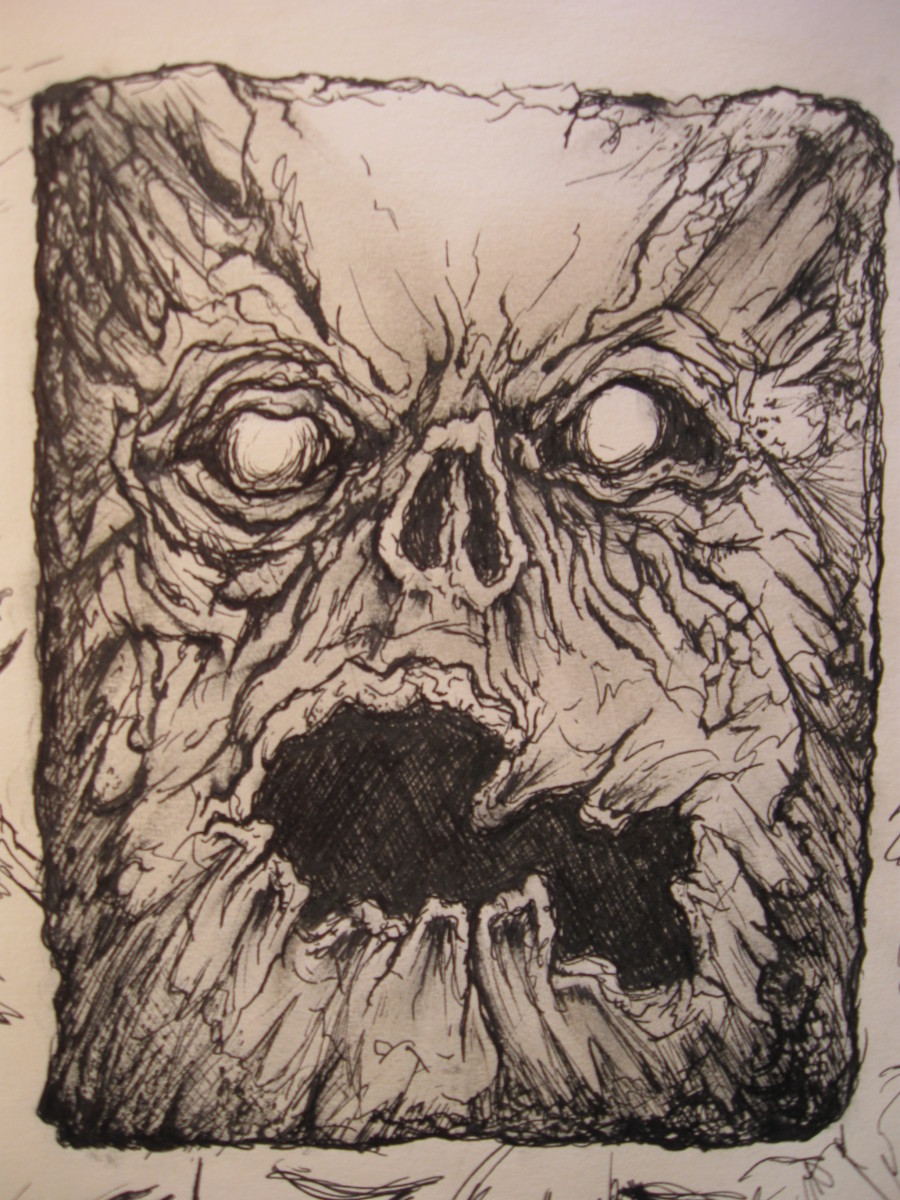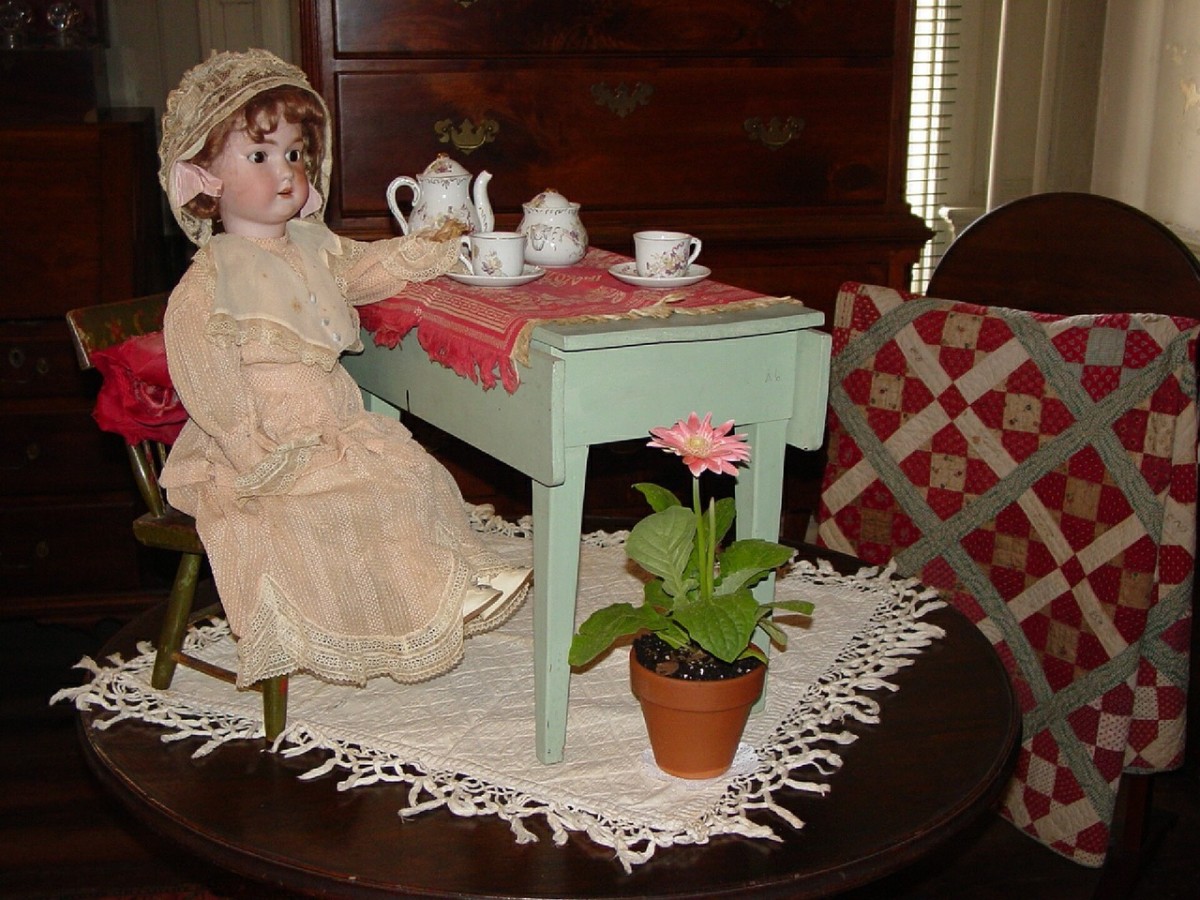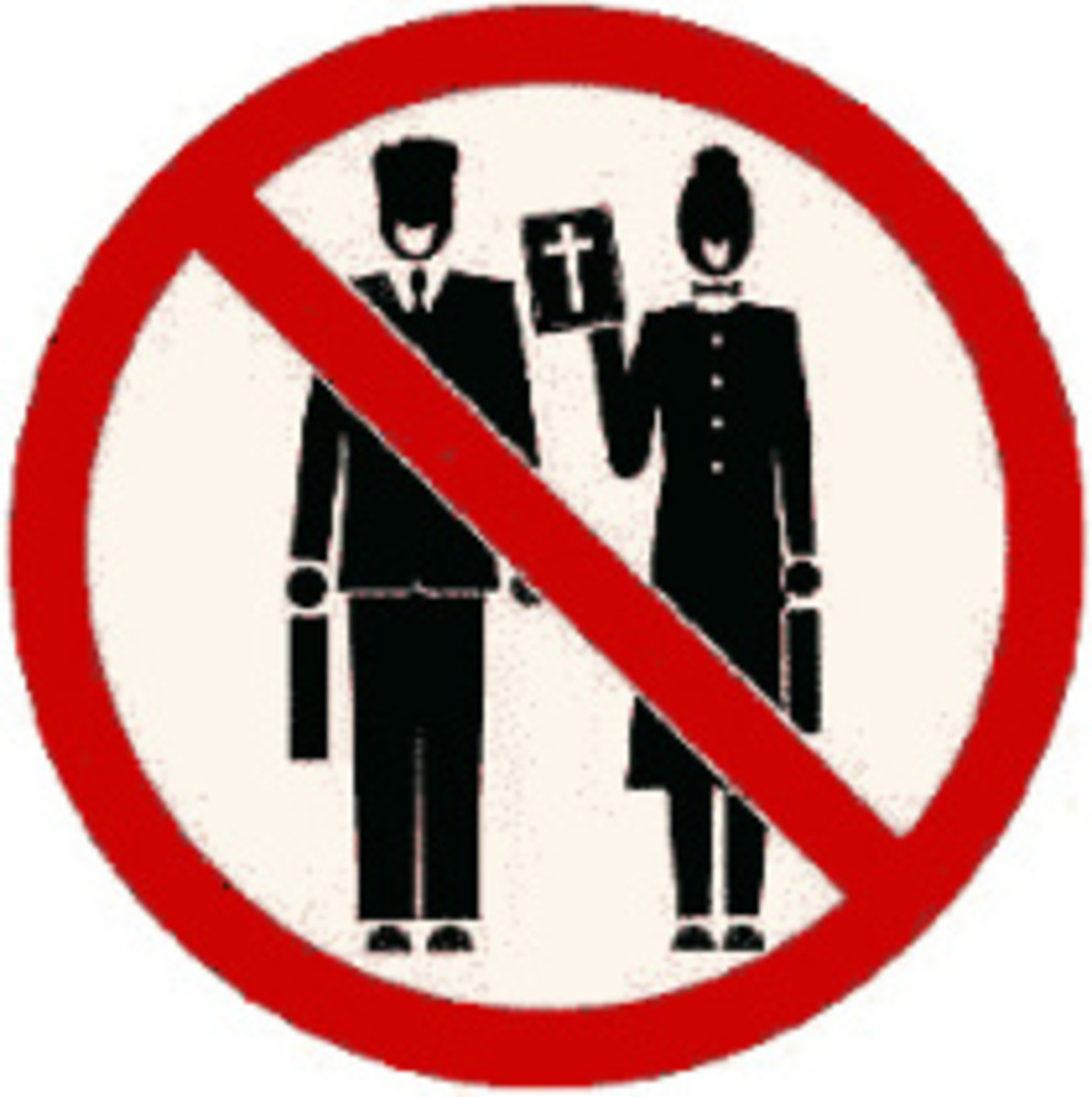Tasmania: Living in the House that Doesn't Exist. (1)
The old house
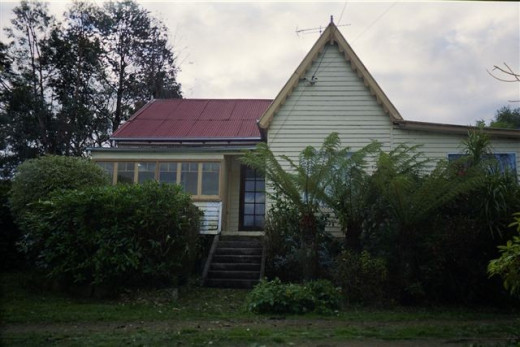
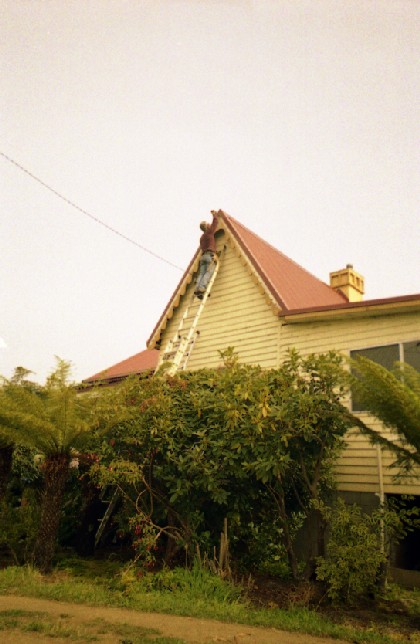
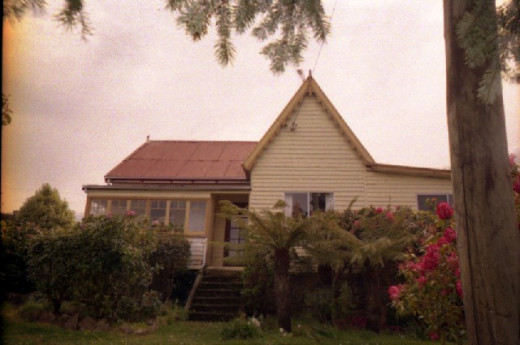
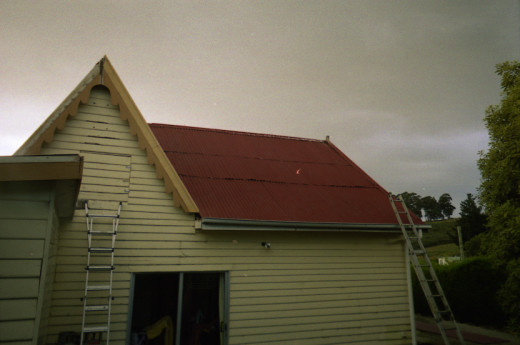
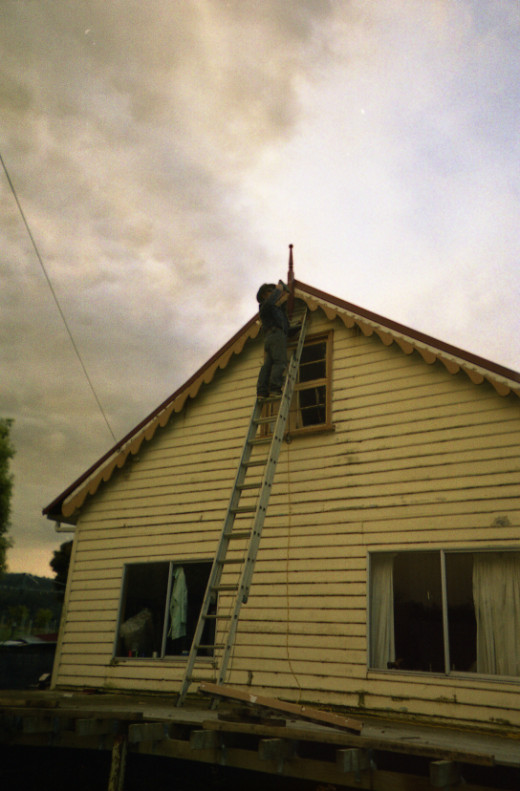
our arrival
Arrival
A hint of fog shrouded the darkening landscape as I drove down a narrow country road towards our future. As I approached the end of my journey and entered the gravel driveway to our new house, a giant hedge reached out with long wet tendrils and swished down the side of the car. Dusk and countless blackberry brambles hid the House that Didn’t Exist.
I slowed down and peered through the gloom, sighting worn paint and dirty windows partially visible through the dripping leaves and thorns. ‘We’ve made it, you poor thing,’ I reassured my cat that was howling pitifully from the back seat. ‘We’re here.’
Zen's eyes were wide with stress and she let out yet another protesting scream, shattering my worn eardrums.
Finally, I pulled up beside a two-story corrugated iron barn, looming silver in the headlights. I got out, stretched my stiff legs, opened the rear door and pulled out the cat pack.
Two days ago, we had shoved Zen into the same pet pack. She thought she was going to the vet and began protesting. Poor cat, little did she know that she’d be howling for three days.
Rod, who was really looking forward to his retirement, put her in the passenger seat of our new one tonne truck, that was already packed high with our immediate needs. With his broad, slightly lopsided smile, he leapt into the truck and he led off down the road away from our suburban house. I followed in our sedan also heavily loaded with clothes and precious possessions we didn’t trust to a freight carrier. We were on our way to the boat and our ocean crossing to Tasmania and our new life.
Once on board the boat, The Spirit of Tasmania, we discovered Zen was allocated a pet berth between two huge dogs. That sent her into full nervous breakdown mode. Her already pitiful cries turned into shrieks of fury. Trying to get her out of her pet pack and into the ‘berth’ was a very interesting experience. She doubled in size, spread out all four limbs and grabbed the sides of the cage. She did everything not to go into the steel jail.
Needless to say, Zen lost the battle and we took ourselves off to find our cabin, dabbing the odd blood spots on our hands.
We were looking forward to a quiet crossing of Bass Straight and I think I was in a form of shock. We had talked about our move for more than a year. It had been a bit of a dream. Now, we had really done it. We had sold everything. Left our kids, our friends, our jobs and all our safe infrastructure we took for granted and that made our life easy, like our doctors and lawyers.
We really were going off to renovate a ruined old house on sixteen acres of neglected farmland at the end of the world!
I wasn’t sure if we had done the right thing. I wasn’t sure if I was cut out for country living. We had never renovated an old wooden house, nor renovated anything. We’d never planted a vineyard and I had never been interested in gardening. I think I felt as nervous as our cat. As the night fell and the Ferry Boat left the shores of Mainland Australia, I remember looking back as the land slipped away and thinking, I doubt we’ll last a year.
‘Our new adventure,’ Rod interrupted my negative thoughts. ‘We’re off to our new life.’ He ran his hand through his thick greying hair and tipped his head back. He looked so happy. He’d just retired, freedom beckoned him, and we were going off to live his dream. I hoped it didn’t become our nightmare.
When we arrived in Devonport, Rod and I went down to collect Zen from her cage. We heard her howling before we saw her. We opened the door of her ‘berth’ and she leapt into my arms, clinging to my shoulder, claws dug in, just in case we tried to put her back inside. I soothed her with clucky noises and she seemed to calm down.
Then to her dismay we shoved her back into the dreaded pet pack. Her howls made other folk who were busily hopping into the cars look at us in pity. I knew Zen wasn’t going to enjoy the journey ahead. I pitied Rod because he’d driven with her to Sydney the day before. I knew his day wasn’t going to improve.
We had a long drive because we had to drive from the north of the state, right down through Hobart, out the other side and into the Huon Valley.
Rod winced at her caterwauling. ‘Let’s throw a coin and see who drives with her today.’ Without waiting a second a coin was produced.
I nodded apprehensively. The coin spun. ‘Heads!’ I yelled.
We looked at the fallen coin. ‘Oh, it’s tails.’ Rod gave me a pitying stare and raced for the truck.
I took the pet pack and followed him through the scenic Tasmanian countryside.
Zen’s ear splitting complaints made me wish I had a back seat full of kids vomiting and screaming ‘are we there yet,’ over and over again.
By the time I had driven through Hobart and negotiated the winding roads of the Huon Valley, I had a headache. I was so glad we had finally arrived at the House that Didn’t Exist.
Zen’s howls made me hurry up and find the keys to the house. The poor creature needed to be released as quickly as possible. I pulled the keys from the glove box and carrying Zen, made my way to the back door of the grubby wooden house buried under gloomy creepers. The chill of the winter evening made me shiver. I wished I’d put on a coat.
The back door leaned forward slightly, hanging from its jamb, and a gaping hole of splintered wood under the handle showed where someone had once smashed it apart and had fixed it again rather roughly.
I pushed the key into the keyhole, wriggled it, wriggled it again, and without a turn, the door opened. A waft of stale dog and dead rat nearly sent us back to the car.
Zen stopped howling and her fur and tail fluffed making her twice her size. She obviously thought we were about to put her back into another cage beside more dogs.
I fumbled for a light switch and there was an instant glow, dulled by the brown, brown and more brown, of the interior décor.
Brown lino enhanced the grubby brown walls of the laundry and bathroom that were the first rooms inside. I opened the pet-pack, released Zen in the bathroom. I looked up for a minute and caught a look at my face in the fly-spotted mirror. My blond hair was lank, my green eyes rather haggard and I looked more tired than I felt.
Despite the depressing sight, I quickly shut the bathroom door and raced back to the car, and pulled out kitty litter and cat food. I raced back and tended to her needs and then returned to the car to retrieve a box of plates, knives and forks.
I was just wondering where to put our plates when headlights lit the gloom outside. Rod had arrived. He had stopped at the Franklin fish and chip shop and brought our evening dinner.
‘It’s freezing,’ Rod said, as he came through the door. The smell of the fish and chips stopped further conversation. We let the cat out of the bathroom and sat on the floor between the many empty rattraps that someone had placed all over the room, the rat poo that had collected in every corner and ledge and ripped open the hot paper and devoured the yummiest tempura mushrooms and chips. We licked our fingers while Zen clung to our sides.
‘So, will we explore?’ Rod’s large brown eyes were wide with anticipation.
a few photos around the house in the early days.
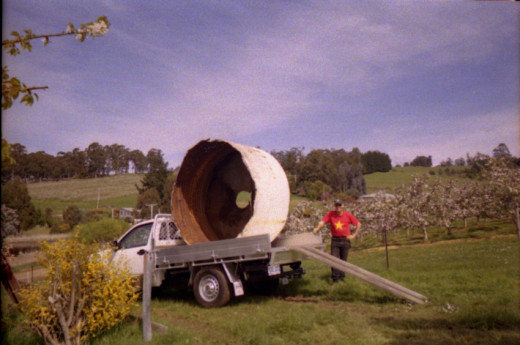
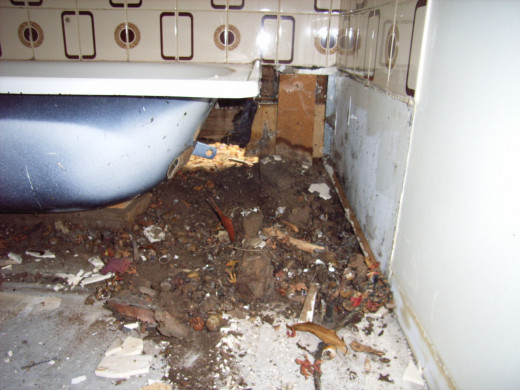
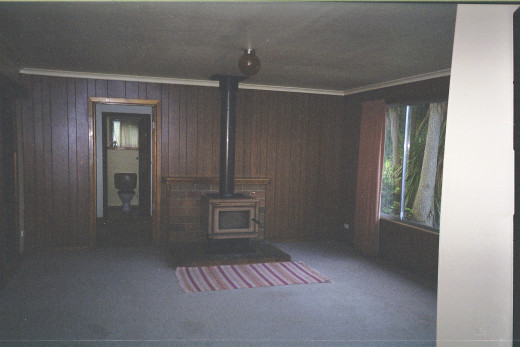
exploring our new house
Together we went out of the lounge, turned on a light and surveyed a wide room come-hallway. The floor was covered with a tone on tone brown shag pile hall carpet, highlighted with dirty stains and festooned with more rattraps. The floor moved under my feet and the walls shuddered at every step.
‘Stumps are gone!’ Rod banged his feet hard on the shaking floor.
At one end of the room a wooden ladder disappeared into a dark hole in the ceiling. ‘I don’t like the look of this bodgy old ladder,’ he added. As he spoke a chill wind wafted down through the hole in the ceiling, drifted through the house, lifted the mouldy curtains from the window behind us and ruffled my hair.
‘There’s a fourth bedroom up there,’ Rod said. ‘It would be cold and draughty to sleep there I reckon.’
I had seen the house only once before but from the outside. We had been in Tasmania on holiday just before Rod retired, when, late one afternoon, we stopped for a cool drink in a little heritage town. We sat on the town’s boardwalk beside the Huon River, in front of a wooden boat building school and just down the road from a ‘Palais Theatre’.
Out on the mirror-still Huon River was a small island, and to the East, where the river was born, a beautiful range of mountains took our breath away. One of the mountains looked like a woman sleeping. Her proud breasts and her aristocratic profile were dark blue against the brilliant sky. Her hair flowed backwards on a pillow of darker hills. ‘That’s Sleeping Beauty,’ Rod told me, as he looked at our map. The town beside us consisted of wooden, run down, oddly painted, strangely angled houses. A sign told us the town was built in 1836. ‘It’s so beautiful,’ I replied.
We went house hunting because we realised the land fitted Rod’s retirement criteria. We had been searching the New South Wales coast for somewhere we could grow grapes, go sailing and be two hours from Sydney. We suddenly realised we could sail on the Huon River, grow cold climate grapes and we were only two hours from Sydney if we flew. Living down here was a long way from everyone we knew, but the place called to us. It would be a new adventure. We decided to give it a go.
And so, we began house hunting on our holiday, until we came across this old farmhouse overgrown by an impenetrable jungle of blackberry, ivy, briars and thistles. Most of the trees in the choked garden were of the weed variety, pine, birch, willow, holly, hawthorn and privet, all intertwined with invasive creepers, blackberries and briars that blocked the sun.
The paint on the weatherboards was green with moss. The house was tenanted, we were told and had been neglected for more than 40 years.
The tenants had kindly gone out for the day, but they had left their four large dogs in attendance. They barked angrily from inside. Their massive slobbering jaws gaped at us through the fly blown windows. The front door steps were slimy and smelled of urine. Birds nested under the bent corrugated iron on the roof. Grass grew from the gutters. The old iron roof on the veranda was loose and flapping in the wind. At some stage someone had climbed up and placed a load of broken bricks on the iron along with a large chunk of car engine, but that had done little to stop the disintegration of the roof.
The stone foundations had gaping holes. The foundation stones had been rolled into position more than a hundred years ago. The builders back then had been too poor to buy cement, so the rocks had been roughly pushed together to make a base for the wooden house.
We entered the house with trepidation and the dogs moved out of our way but snarled threateningly. The smell of rats, dogs and stale beer was overpowering. We decided not to go further. ‘We can see it’s a mess,’ I said. ‘How old is the house?’
‘Not sure,’ the real estate agent replied, ‘but at a guess you couldn’t go wrong with the 1850’s.’ He tapped the old chimney in the lounge. ‘Convict bricks!’ He smiled, hoping it was a sale point.
He must have seen that I was looking very worried. It wasn’t the fact that the house was dreadful and stunk to high heaven, it was the fact I could hear Rod’s brain going faster than a computer, analysing all the things that would keep him busy, while I was analysing all the things that he couldn’t do and had never done, and was wondering if retirement was actually a good idea after all.
‘But it’s a good price,’ said the agent, fearing he was losing a sale. One of the four dogs began growling protectively and I didn’t much like the look on its torn ears or its barred fangs. We went no further into the ruin with the decorative rattraps on the floor of the lounge.
We returned to the outdoors. Not far away was the most magnificent view over the wide mouth of the Huon River, Egg Island, and across to a forested mountain several kilometres away, called Grey Mountain. The house was also close to a deep-water port and ten minutes from a supermarket and the larger country township of Huonville, that boasted, doctors, shops, hairdressers, chiropractors and dentists. It was only 45 minutes from Hobart… And….. we wanted a challenge. ‘It’ll give us a lot to do,’ said Rod. ‘We’ll need to keep busy. It’s terrible to be bored. People go mad in retirement if there’s not enough challenge.’
I nodded, but I can’t remember why.
I also knew that once the garden was cleared and the dead cars, rusted rainwater tanks, rubbish, beer bottles and blackberries were removed, we would have a view, and a lovely property. I also wondered how it would be done, but retirement was a way off yet. We didn’t think much about the renovations. I vaguely thought it couldn’t be that hard.
We asked a few more questions and the agent explained a little about the town of Franklin, and how the early settlers, rolled the stones from the bush and hand cut the timbers for the studs and joists for the house, so we had to expect that nothing would be square. There were little building materials down in this part of world in the old days, and they built with what they could find. Those pioneers cut their own wooden shingles and made their own nails. This explained the very high steep roof. The precipitous incline was needed so the rain would roll off the shingles. Yes, there were shingles still in place under the bent and flapping corrugated iron.
Then, as Rod seemed so keen on the idea of renovating the house, we went into the Huonville Council to check there weren’t any encumbrances on the property. The council building is an old brick building, and behind the counter was an elderly lady with tightly permed hair and a front tooth missing. We took out the map reference and the planning reference. ‘We’d like to check on this house we want to buy.’ Rod explained, holding out the address and details the real estate agent had provided. The lady vanished and returned with a larger map. ‘There’s no house there,’ she said.
‘There is a house there!’ Rod insisted.
‘Not one on this plan,’ she replied.
‘There must be,’ I explained. ‘We were just there. It was built ages ago.’
‘How long ago,’ the lady snapped.
‘We were told it was built in 1850.’
‘That explains it then,’ she answered. ‘They didn’t make plans back then. Anyway, if there had been any plans, they would have been lost in the fires.’
‘Fires?’ we asked, puzzled.
‘Fires!’ she replied, in a firm voice that brooked no further questioning. It seems that only idiots wouldn’t know about the fire, so we left that conversation alone.
‘So, what does that mean?’ I asked.
‘It means, that the house isn’t here on any plans so it doesn’t exist as far as we’re concerned,’ she answered.
‘So, is it legal?’ I asked again. ‘If it doesn’t exist, can we insure it?’
‘Well, of course you can!’ She gave me a look reserved for special idiots. ‘If it burned down, anyone could see the ruins, so obviously, even though it doesn’t exist on our plans, an insurance company could see that it did exist.’
‘So,’ Rod quietly interjected, ‘does that mean we can live in it and there is no impediment to us buying it.’
‘Of course you can,’ the lady replied.
On the strength of her word I tried a few insurance companies for a cover note. It was harder than we thought. Imagine the following:
Insurance agent: How old is the house?
Me: 150 plus years.
Insurance agent: 150 years (shocked tone). What is it made of?
Me: Wood.
Insurance agent: Wood?? (big, audible sigh) What locks does it have on the windows and doors?
Me: None. (I almost added, ‘Why would you need locks? We are miles out in the country, without mail delivery, town water, sewerage, or garbage collection. If a robber came we’d welcome the human contact.. besides…the windows pop open when you touch them and the doors are off their hinges.)
Insurance Agent: I don’t think we can do anything for you.
Several phone calls later we found an insurance agent, a Tasmanian broker, who understood about old wooden houses, that didn’t exist, and the fact that Tasmania doesn’t have white ants.
Since then, we hadn’t been back to the house. Only the week before we had packed up to come to Tasmania I had found a book in a second handbook store called ‘How to Build a Wooden House’. I had picked it up, thumbed through it and thought, ‘If we get stuck, we can always use this.’ Now I looked at our disaster and thought, ‘I don’t think any book would cover the problems in this place.’
To make matters worse, I suddenly realised that someone in the past had removed the old wooden windows and installed aluminium ones. I hadn’t noticed this when we bought the place.
The nineteen sixties aluminium windows had sweated in the cold. Moss sprouted on the internal sills. The moss grew on layers of dead flies, jamming the runners.
The glass was filthy and the drapes that partially covered them were smelly. I was saddened to think the old windows were gone.
Then I looked more closely at the wallpapered walls. They weren’t made of wood or gyprock. I had, had a false memory that the walls were wood. I tapped the wall in front of me. It wobbled. ‘Masonite!’ Rod said. ‘Probably put on in the sixties along with the windows. See we bought a renovated house!”
We stepped into the main bedroom. The walls there were papered differently. There were flowers and leaves on one wall, stripes on another, little animals on the next, a bamboo pattern on the end wall, and some lovely flocked paisley to top everything off around the window. Someone, in years gone by, when money was tight, had obviously gone mad at a throw out sale.
Then Rod and I went into the third bedroom that faced south. The smell of mould was stronger in this room and the mouldy carpet, squished slightly under our feet. The window was extensively overgrown with fly spots and moss and, once again, the wallpaper was different on every wall, and they had wallpapered the ceiling with a mock pressed-tin design.
Under the light of the bare bulb, we could see that the wallpaper was stained and mouldy. It hung down in patches and bubbles. Lines of stained rat urine and little rat poos hung from the corners of the room. Spider-web fascinators connected it to the walls and to the light bulb, that in turn, hung from a frayed electric cord.
‘Electrics,’ I said. ‘Those cord covered old things from the early 1900’s! It can’t be safe!’
‘Can’t be that bad,’ countered Rod. ‘They’re still working.’
Then, to add to add to my gloom the wind came up and rain pelted on the tin roof and the curtains moved in the breeze. I noticed sticky tape layered over some holes in the walls. It was a very sad attempt at keeping out the cold. There was nothing between us, and Antarctica except sticky-tape, paper, rotten boards, rat-poo and masonite.
I stepped over the rattraps and made my way to the kitchen. I also noted there were no cupboards or wardrobes in any of the other rooms. The kitchen had the only bent, grimy, cupboards in the house.
The kitchen! The room where the new, little-farmer-woman was to whip up the daily dinner was a disaster. The laminex bench had lifted and was extensively cut and burned in places. The brown patterned, sixties tiles were thick with grease and grime. The lino on the floor was burned, stained and the dirt in the corners was millimetres thick. I tentatively opened a cupboard. Rat droppings! Layers of rat droppings on every surface! And joy of joys! A rattrap behind every door.
The more I looked the more poo I saw. There were buckets of rat-droppings! They hung from spider webs that festooned the ceilings and lay in abandoned patterns on the benches floors and skirting boards.
Not wanting to think of the scrubbing and cleaning that faced me in the morning, I left the kitchen and went back into the lounge and sat down beside the grease proof paper left from our meal.
‘What have we done?’ I gasped. The day had been long and I was beginning to let my spirits sag, although the cat had suddenly got a new lease on life and had suddenly started running from room to room with its tail waving aggressively. ‘Zen’s in seventh heaven,’ said Rod. ‘She’s after those pesky rats.’
‘I’m exhausted,’ I grumbled. ‘I can’t think about any of this right now!’
‘Let’s get our gear from the truck,’ soothed Rod. ‘We’ll light a fire in the wood heater and warm up and have our first night’s sleep and wake up to our new adventure.’
‘We’re sleeping in the lounge,’ I said, eying off the old nineteen sixties looking wood heater that had a few rust stains on it. ‘The other rooms are too disgusting.’
We made our way out to the truck and unloaded the sleeping mat and our sleeping bags. While I cleared a few rattraps from the lounge floor, unrolled the mattress in front of the wood heater and made up our bed, Rod attempted to light a fire.
Rod found some wood out in the yard, stuffed paper into the heater and lit a match. As the flames caught the wood, a crumbling, whooshing sound filled our ears. The fire seemed to go out.
I opened the heater door to see what was going on. Buckets of soot exploded into the room, followed by billowing smoke. I shut the fire door too late.
The smoke just kept oozing out of the heater. It got thicker and thicker and filled the room. Then a very high-pitched alarm startled us. ‘We’ve got a fire alarm,’ Rod said.
He sounded pleased!
A few minutes later, he wasn’t so pleased, because we couldn’t find how to turn it off. It was high on the old roof and we didn’t have a ladder. Worse, the smoke got thicker and heavier! We waved our arms trying to see, as the room filled with an eye-watering fog.
I tried to turn off the air to the fire, but the knob on the stove wouldn’t shift. We raced to every window and hauled them open. Freezing air wrapped itself around us.
Eventually, the smoke alarm stopped of its own accord and we finally closed the warped aluminium windows. We didn’t dare touch the fire again and thankfully it seemed to have gone out. We were too exhausted to do anything else so we put on all our clothes, snuggled into our sleeping bags, and made ourselves comfy. Zen cat snuggled up between us and purred.
At some stage during the night I awoke. The fire had restarted without any help from us and there was a warm glow from the wood heater. I looked out the window and the heavens were full of the most amazing stars. I snuggled back down with the cat purring between us and slept till dawn in The House That Didn’t Exist.
more photos of the early days
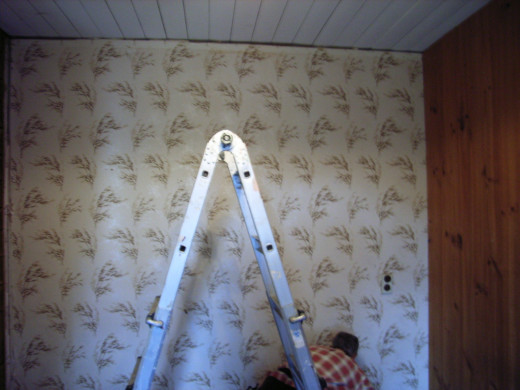

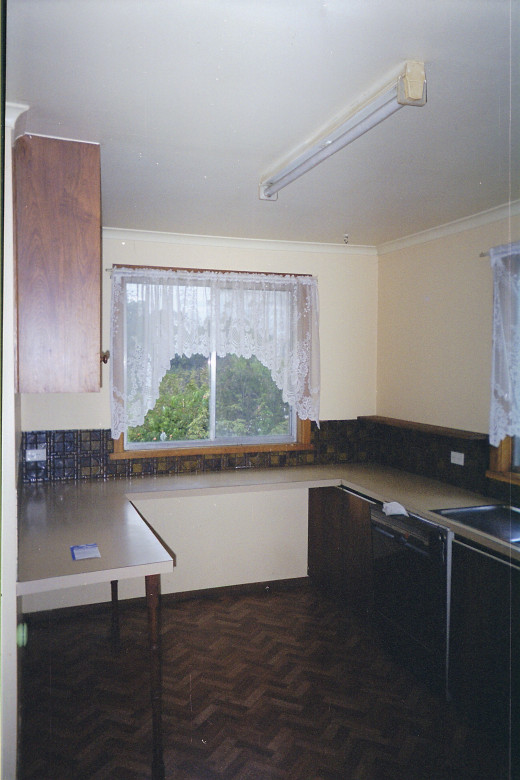
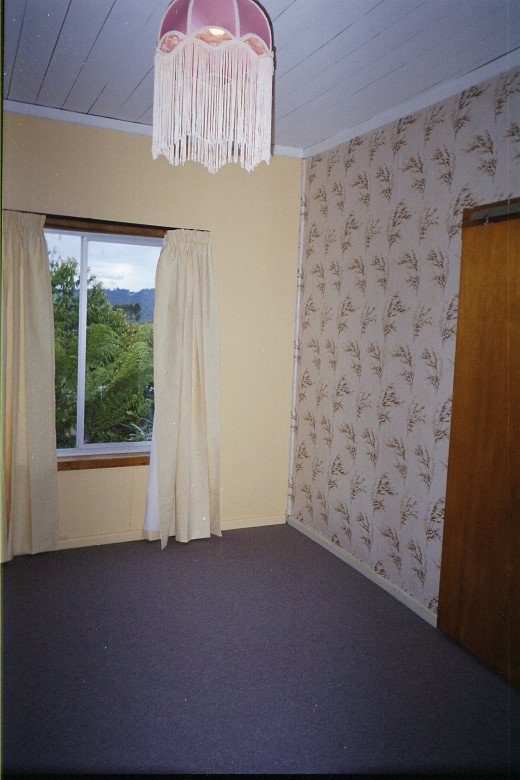
Continued.
I'm posting more stories and continuing stories from the House that Doesn't exist in new hubs. If you enjoyed this, then please go to the next sequential House that Doesn't exist Hub.
Thank you
Eleanor.
the second chapter of this story is on:
- Tasmania: Living in the House that Doesn't Exist. (2)
The second day in our new 'house' planning how to renovate, and where to start.


